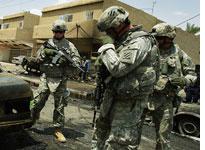Originally posted by Patroklos
I think I am misunderstanding you. Are you asking me about people on the right that already consider Iraq a defeat no matter what, or people on the right who disagree with the premise of the war?
I think I am misunderstanding you. Are you asking me about people on the right that already consider Iraq a defeat no matter what, or people on the right who disagree with the premise of the war?
I supported the war based upon the evidence provided (evidence that you , I , nor anyone else could verify 1st hand). This evidence of course turned out to be fraudulent. My support ended (hence I disagreed with the "premise").
I also think Iraq is a lost cause (wrt USA) no matter what. Partly b/c of the false premise that brought on the war (your nation is morally wrong) and partly b/c of the reasons East Street just outlined.
Therefor, I am on the right and I oppose the war b/c it is not winable and it is morally wrong. My opposition can't be politically motivated. I have no love of the Democratic Party and couldn't vote for them evn if I did.



Comment